Social Psychology Essay: Altruism vs. Self-Interest in Human Behavior
VerifiedAdded on 2023/06/13
|8
|2054
|241
Essay
AI Summary
This essay delves into the concept of altruism, contrasting it with self-interest from a social psychology perspective. It examines various theories, including Batson's empathy-altruism theory and Hamilton's kin selection theory, to understand the motivations behind altruistic behavior. The essay also considers the views of psychologists like Freud, Jung, and Maslow, who offer insights into the underlying personal motives driving seemingly selfless acts. Ultimately, the essay concludes that while altruism exists, many human actions are often motivated by personal needs, such as ego satisfaction or other forms of personal gain. Desklib provides a platform for students to access similar essays and solved assignments for academic support.
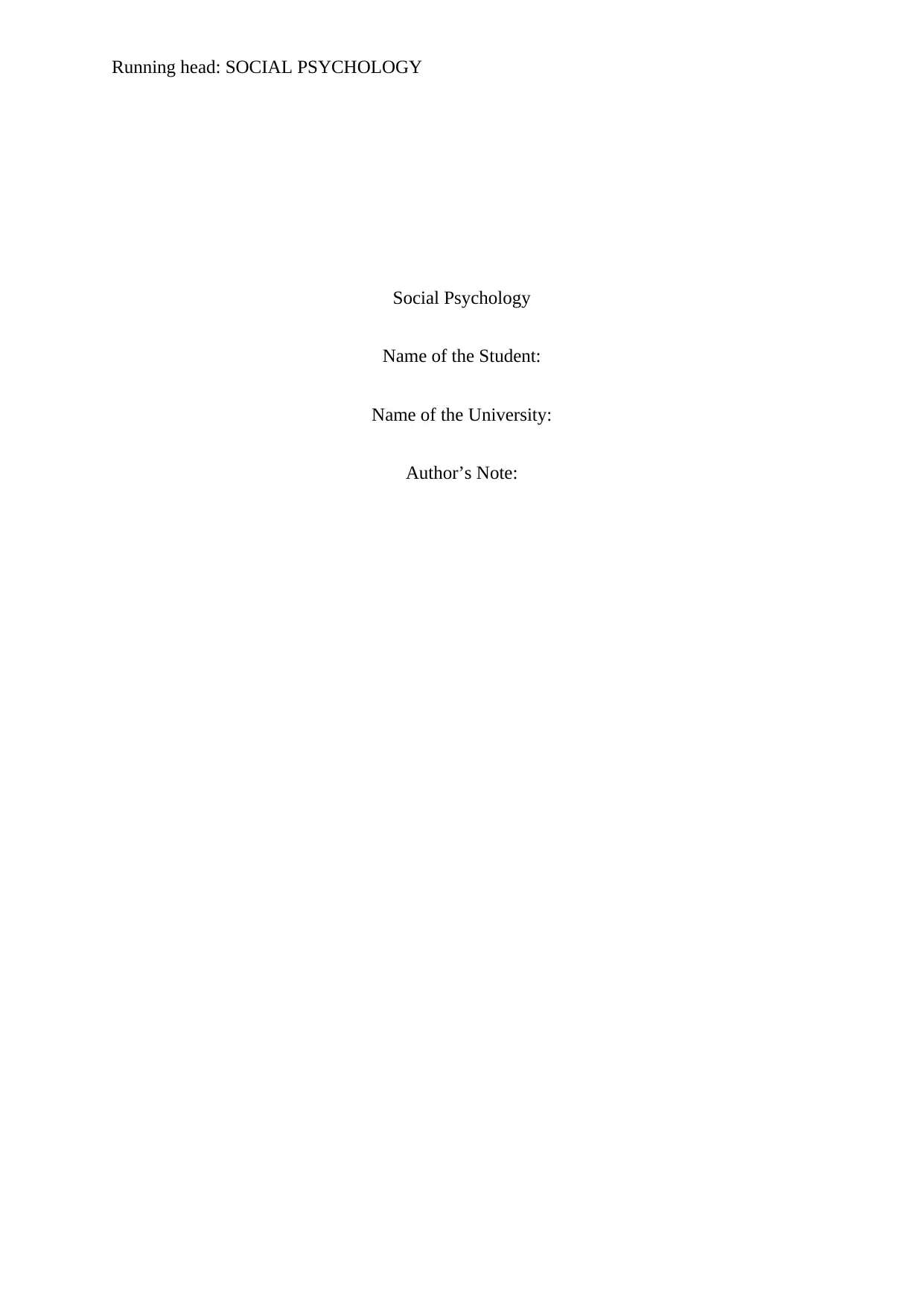
Running head: SOCIAL PSYCHOLOGY
Social Psychology
Name of the Student:
Name of the University:
Author’s Note:
Social Psychology
Name of the Student:
Name of the University:
Author’s Note:
Paraphrase This Document
Need a fresh take? Get an instant paraphrase of this document with our AI Paraphraser
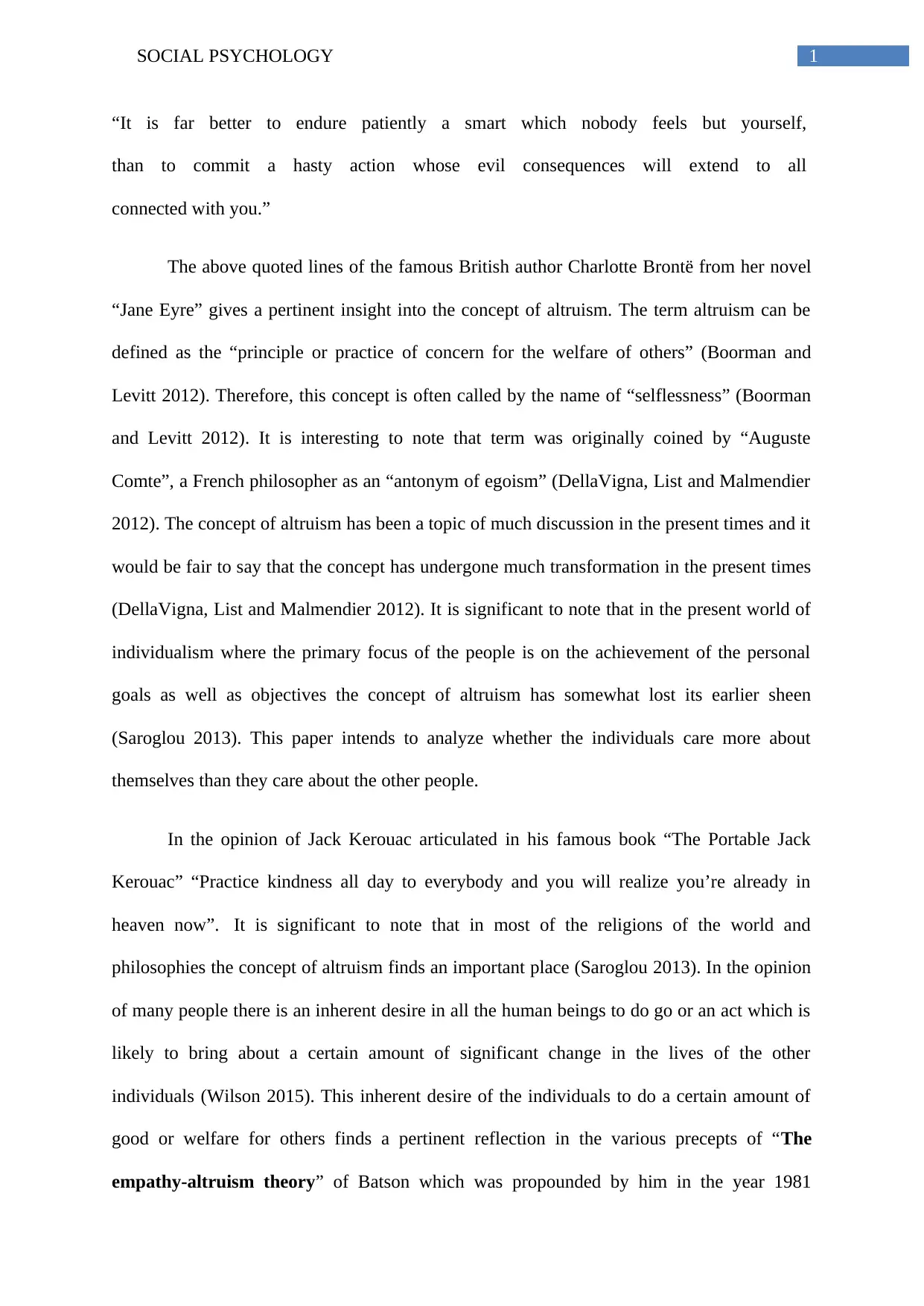
1SOCIAL PSYCHOLOGY
“It is far better to endure patiently a smart which nobody feels but yourself,
than to commit a hasty action whose evil consequences will extend to all
connected with you.”
The above quoted lines of the famous British author Charlotte Brontë from her novel
“Jane Eyre” gives a pertinent insight into the concept of altruism. The term altruism can be
defined as the “principle or practice of concern for the welfare of others” (Boorman and
Levitt 2012). Therefore, this concept is often called by the name of “selflessness” (Boorman
and Levitt 2012). It is interesting to note that term was originally coined by “Auguste
Comte”, a French philosopher as an “antonym of egoism” (DellaVigna, List and Malmendier
2012). The concept of altruism has been a topic of much discussion in the present times and it
would be fair to say that the concept has undergone much transformation in the present times
(DellaVigna, List and Malmendier 2012). It is significant to note that in the present world of
individualism where the primary focus of the people is on the achievement of the personal
goals as well as objectives the concept of altruism has somewhat lost its earlier sheen
(Saroglou 2013). This paper intends to analyze whether the individuals care more about
themselves than they care about the other people.
In the opinion of Jack Kerouac articulated in his famous book “The Portable Jack
Kerouac” “Practice kindness all day to everybody and you will realize you’re already in
heaven now”. It is significant to note that in most of the religions of the world and
philosophies the concept of altruism finds an important place (Saroglou 2013). In the opinion
of many people there is an inherent desire in all the human beings to do go or an act which is
likely to bring about a certain amount of significant change in the lives of the other
individuals (Wilson 2015). This inherent desire of the individuals to do a certain amount of
good or welfare for others finds a pertinent reflection in the various precepts of “The
empathy-altruism theory” of Batson which was propounded by him in the year 1981
“It is far better to endure patiently a smart which nobody feels but yourself,
than to commit a hasty action whose evil consequences will extend to all
connected with you.”
The above quoted lines of the famous British author Charlotte Brontë from her novel
“Jane Eyre” gives a pertinent insight into the concept of altruism. The term altruism can be
defined as the “principle or practice of concern for the welfare of others” (Boorman and
Levitt 2012). Therefore, this concept is often called by the name of “selflessness” (Boorman
and Levitt 2012). It is interesting to note that term was originally coined by “Auguste
Comte”, a French philosopher as an “antonym of egoism” (DellaVigna, List and Malmendier
2012). The concept of altruism has been a topic of much discussion in the present times and it
would be fair to say that the concept has undergone much transformation in the present times
(DellaVigna, List and Malmendier 2012). It is significant to note that in the present world of
individualism where the primary focus of the people is on the achievement of the personal
goals as well as objectives the concept of altruism has somewhat lost its earlier sheen
(Saroglou 2013). This paper intends to analyze whether the individuals care more about
themselves than they care about the other people.
In the opinion of Jack Kerouac articulated in his famous book “The Portable Jack
Kerouac” “Practice kindness all day to everybody and you will realize you’re already in
heaven now”. It is significant to note that in most of the religions of the world and
philosophies the concept of altruism finds an important place (Saroglou 2013). In the opinion
of many people there is an inherent desire in all the human beings to do go or an act which is
likely to bring about a certain amount of significant change in the lives of the other
individuals (Wilson 2015). This inherent desire of the individuals to do a certain amount of
good or welfare for others finds a pertinent reflection in the various precepts of “The
empathy-altruism theory” of Batson which was propounded by him in the year 1981
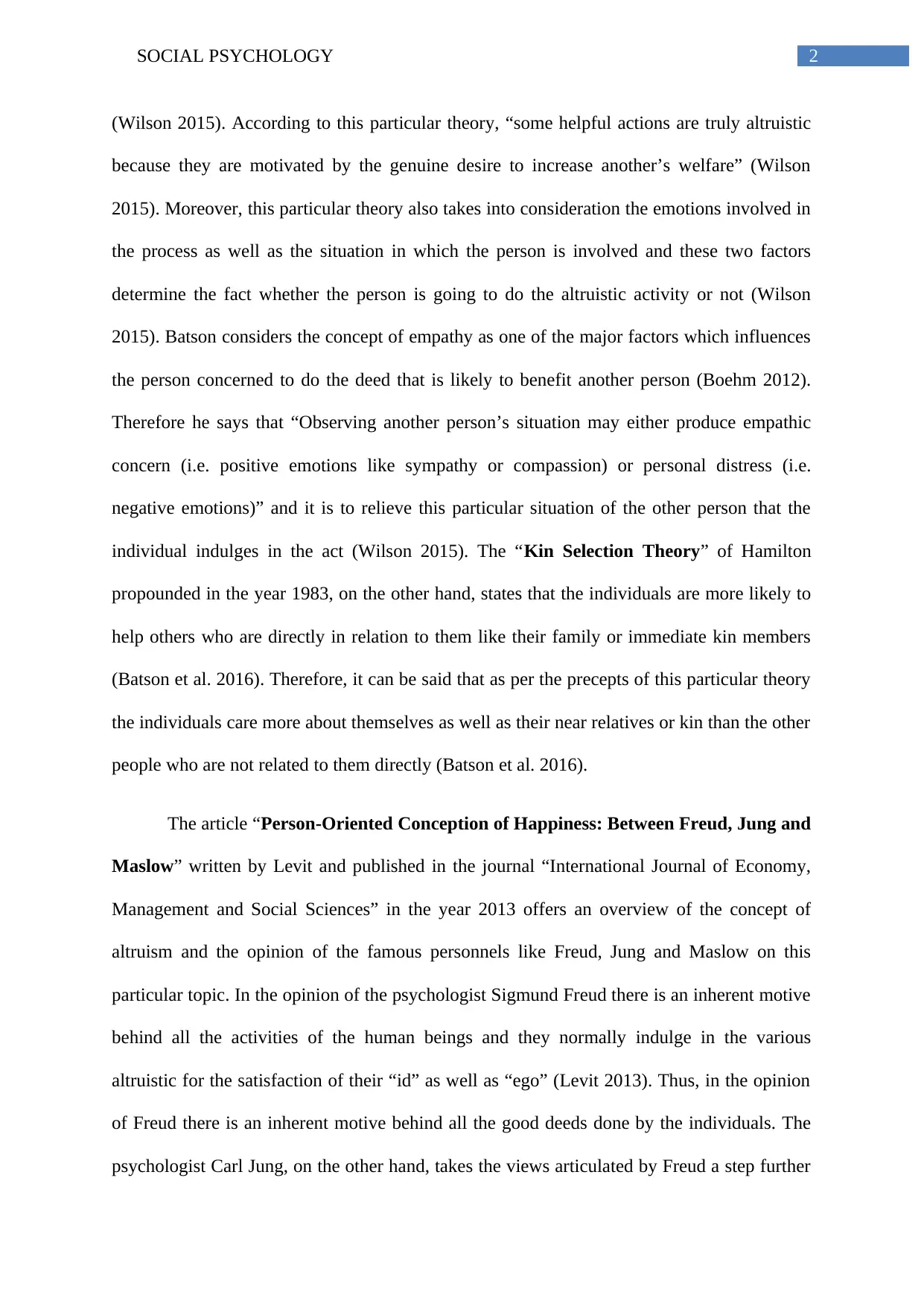
2SOCIAL PSYCHOLOGY
(Wilson 2015). According to this particular theory, “some helpful actions are truly altruistic
because they are motivated by the genuine desire to increase another’s welfare” (Wilson
2015). Moreover, this particular theory also takes into consideration the emotions involved in
the process as well as the situation in which the person is involved and these two factors
determine the fact whether the person is going to do the altruistic activity or not (Wilson
2015). Batson considers the concept of empathy as one of the major factors which influences
the person concerned to do the deed that is likely to benefit another person (Boehm 2012).
Therefore he says that “Observing another person’s situation may either produce empathic
concern (i.e. positive emotions like sympathy or compassion) or personal distress (i.e.
negative emotions)” and it is to relieve this particular situation of the other person that the
individual indulges in the act (Wilson 2015). The “Kin Selection Theory” of Hamilton
propounded in the year 1983, on the other hand, states that the individuals are more likely to
help others who are directly in relation to them like their family or immediate kin members
(Batson et al. 2016). Therefore, it can be said that as per the precepts of this particular theory
the individuals care more about themselves as well as their near relatives or kin than the other
people who are not related to them directly (Batson et al. 2016).
The article “Person-Oriented Conception of Happiness: Between Freud, Jung and
Maslow” written by Levit and published in the journal “International Journal of Economy,
Management and Social Sciences” in the year 2013 offers an overview of the concept of
altruism and the opinion of the famous personnels like Freud, Jung and Maslow on this
particular topic. In the opinion of the psychologist Sigmund Freud there is an inherent motive
behind all the activities of the human beings and they normally indulge in the various
altruistic for the satisfaction of their “id” as well as “ego” (Levit 2013). Thus, in the opinion
of Freud there is an inherent motive behind all the good deeds done by the individuals. The
psychologist Carl Jung, on the other hand, takes the views articulated by Freud a step further
(Wilson 2015). According to this particular theory, “some helpful actions are truly altruistic
because they are motivated by the genuine desire to increase another’s welfare” (Wilson
2015). Moreover, this particular theory also takes into consideration the emotions involved in
the process as well as the situation in which the person is involved and these two factors
determine the fact whether the person is going to do the altruistic activity or not (Wilson
2015). Batson considers the concept of empathy as one of the major factors which influences
the person concerned to do the deed that is likely to benefit another person (Boehm 2012).
Therefore he says that “Observing another person’s situation may either produce empathic
concern (i.e. positive emotions like sympathy or compassion) or personal distress (i.e.
negative emotions)” and it is to relieve this particular situation of the other person that the
individual indulges in the act (Wilson 2015). The “Kin Selection Theory” of Hamilton
propounded in the year 1983, on the other hand, states that the individuals are more likely to
help others who are directly in relation to them like their family or immediate kin members
(Batson et al. 2016). Therefore, it can be said that as per the precepts of this particular theory
the individuals care more about themselves as well as their near relatives or kin than the other
people who are not related to them directly (Batson et al. 2016).
The article “Person-Oriented Conception of Happiness: Between Freud, Jung and
Maslow” written by Levit and published in the journal “International Journal of Economy,
Management and Social Sciences” in the year 2013 offers an overview of the concept of
altruism and the opinion of the famous personnels like Freud, Jung and Maslow on this
particular topic. In the opinion of the psychologist Sigmund Freud there is an inherent motive
behind all the activities of the human beings and they normally indulge in the various
altruistic for the satisfaction of their “id” as well as “ego” (Levit 2013). Thus, in the opinion
of Freud there is an inherent motive behind all the good deeds done by the individuals. The
psychologist Carl Jung, on the other hand, takes the views articulated by Freud a step further
⊘ This is a preview!⊘
Do you want full access?
Subscribe today to unlock all pages.

Trusted by 1+ million students worldwide
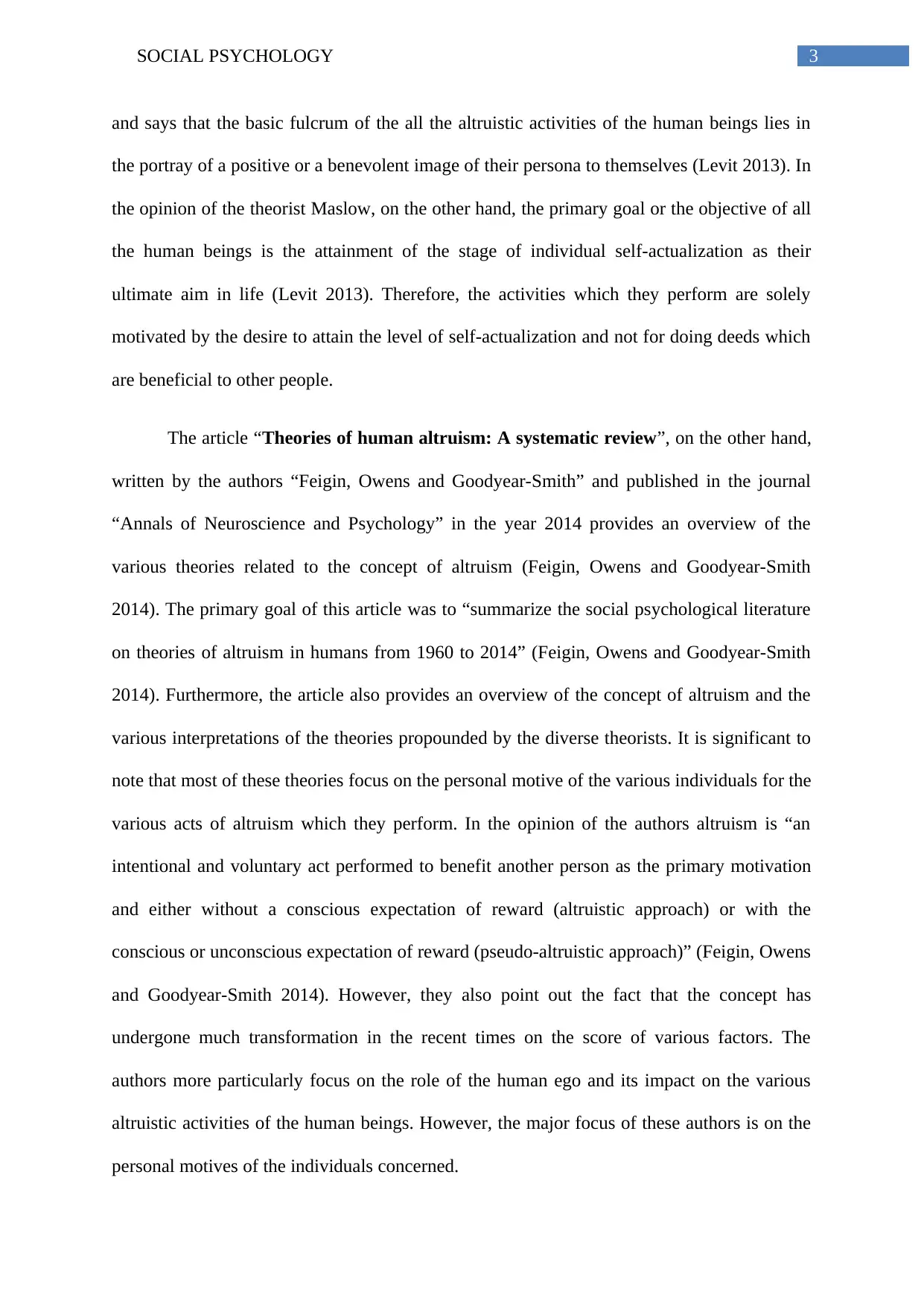
3SOCIAL PSYCHOLOGY
and says that the basic fulcrum of the all the altruistic activities of the human beings lies in
the portray of a positive or a benevolent image of their persona to themselves (Levit 2013). In
the opinion of the theorist Maslow, on the other hand, the primary goal or the objective of all
the human beings is the attainment of the stage of individual self-actualization as their
ultimate aim in life (Levit 2013). Therefore, the activities which they perform are solely
motivated by the desire to attain the level of self-actualization and not for doing deeds which
are beneficial to other people.
The article “Theories of human altruism: A systematic review”, on the other hand,
written by the authors “Feigin, Owens and Goodyear-Smith” and published in the journal
“Annals of Neuroscience and Psychology” in the year 2014 provides an overview of the
various theories related to the concept of altruism (Feigin, Owens and Goodyear-Smith
2014). The primary goal of this article was to “summarize the social psychological literature
on theories of altruism in humans from 1960 to 2014” (Feigin, Owens and Goodyear-Smith
2014). Furthermore, the article also provides an overview of the concept of altruism and the
various interpretations of the theories propounded by the diverse theorists. It is significant to
note that most of these theories focus on the personal motive of the various individuals for the
various acts of altruism which they perform. In the opinion of the authors altruism is “an
intentional and voluntary act performed to benefit another person as the primary motivation
and either without a conscious expectation of reward (altruistic approach) or with the
conscious or unconscious expectation of reward (pseudo-altruistic approach)” (Feigin, Owens
and Goodyear-Smith 2014). However, they also point out the fact that the concept has
undergone much transformation in the recent times on the score of various factors. The
authors more particularly focus on the role of the human ego and its impact on the various
altruistic activities of the human beings. However, the major focus of these authors is on the
personal motives of the individuals concerned.
and says that the basic fulcrum of the all the altruistic activities of the human beings lies in
the portray of a positive or a benevolent image of their persona to themselves (Levit 2013). In
the opinion of the theorist Maslow, on the other hand, the primary goal or the objective of all
the human beings is the attainment of the stage of individual self-actualization as their
ultimate aim in life (Levit 2013). Therefore, the activities which they perform are solely
motivated by the desire to attain the level of self-actualization and not for doing deeds which
are beneficial to other people.
The article “Theories of human altruism: A systematic review”, on the other hand,
written by the authors “Feigin, Owens and Goodyear-Smith” and published in the journal
“Annals of Neuroscience and Psychology” in the year 2014 provides an overview of the
various theories related to the concept of altruism (Feigin, Owens and Goodyear-Smith
2014). The primary goal of this article was to “summarize the social psychological literature
on theories of altruism in humans from 1960 to 2014” (Feigin, Owens and Goodyear-Smith
2014). Furthermore, the article also provides an overview of the concept of altruism and the
various interpretations of the theories propounded by the diverse theorists. It is significant to
note that most of these theories focus on the personal motive of the various individuals for the
various acts of altruism which they perform. In the opinion of the authors altruism is “an
intentional and voluntary act performed to benefit another person as the primary motivation
and either without a conscious expectation of reward (altruistic approach) or with the
conscious or unconscious expectation of reward (pseudo-altruistic approach)” (Feigin, Owens
and Goodyear-Smith 2014). However, they also point out the fact that the concept has
undergone much transformation in the recent times on the score of various factors. The
authors more particularly focus on the role of the human ego and its impact on the various
altruistic activities of the human beings. However, the major focus of these authors is on the
personal motives of the individuals concerned.
Paraphrase This Document
Need a fresh take? Get an instant paraphrase of this document with our AI Paraphraser
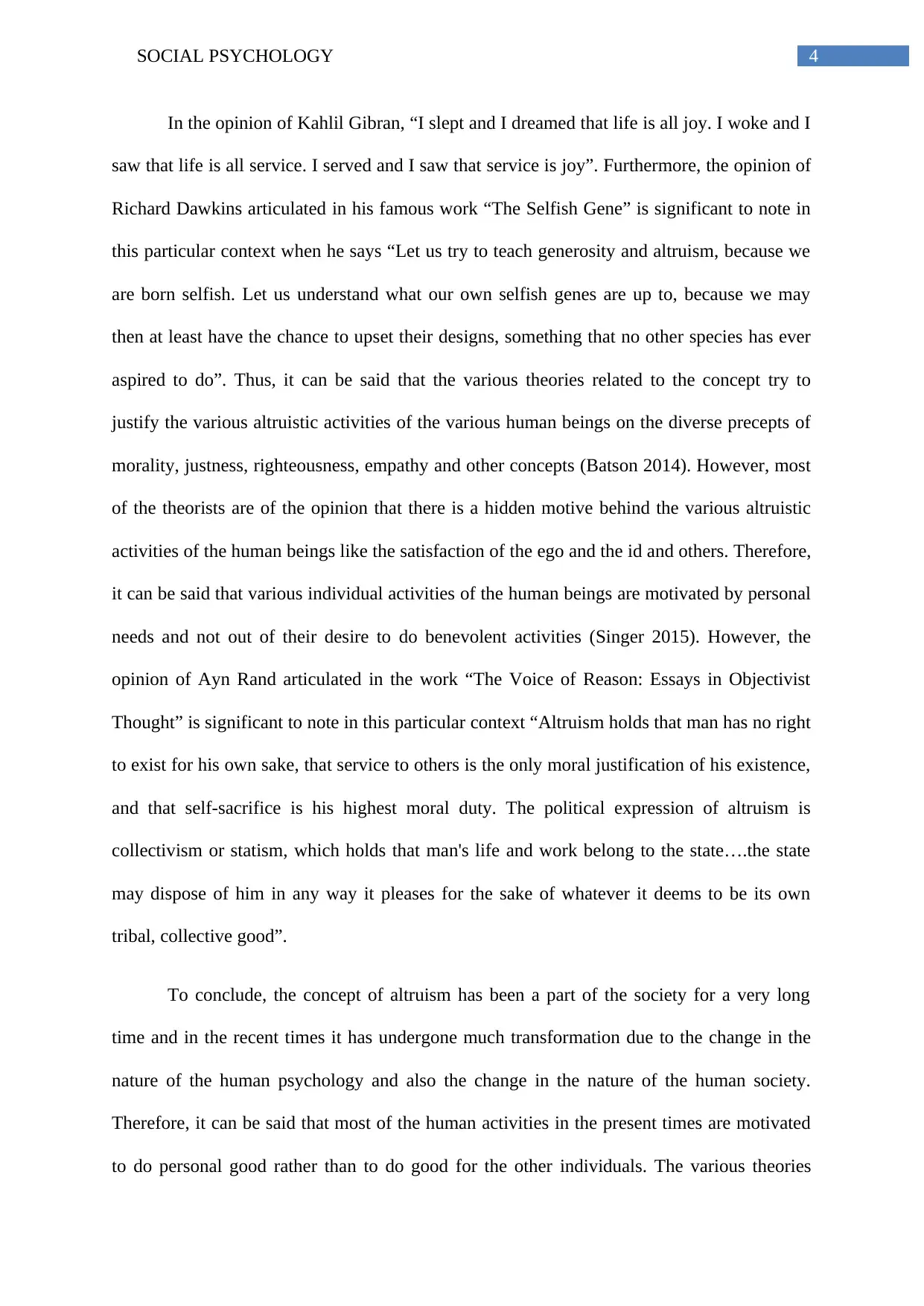
4SOCIAL PSYCHOLOGY
In the opinion of Kahlil Gibran, “I slept and I dreamed that life is all joy. I woke and I
saw that life is all service. I served and I saw that service is joy”. Furthermore, the opinion of
Richard Dawkins articulated in his famous work “The Selfish Gene” is significant to note in
this particular context when he says “Let us try to teach generosity and altruism, because we
are born selfish. Let us understand what our own selfish genes are up to, because we may
then at least have the chance to upset their designs, something that no other species has ever
aspired to do”. Thus, it can be said that the various theories related to the concept try to
justify the various altruistic activities of the various human beings on the diverse precepts of
morality, justness, righteousness, empathy and other concepts (Batson 2014). However, most
of the theorists are of the opinion that there is a hidden motive behind the various altruistic
activities of the human beings like the satisfaction of the ego and the id and others. Therefore,
it can be said that various individual activities of the human beings are motivated by personal
needs and not out of their desire to do benevolent activities (Singer 2015). However, the
opinion of Ayn Rand articulated in the work “The Voice of Reason: Essays in Objectivist
Thought” is significant to note in this particular context “Altruism holds that man has no right
to exist for his own sake, that service to others is the only moral justification of his existence,
and that self-sacrifice is his highest moral duty. The political expression of altruism is
collectivism or statism, which holds that man's life and work belong to the state….the state
may dispose of him in any way it pleases for the sake of whatever it deems to be its own
tribal, collective good”.
To conclude, the concept of altruism has been a part of the society for a very long
time and in the recent times it has undergone much transformation due to the change in the
nature of the human psychology and also the change in the nature of the human society.
Therefore, it can be said that most of the human activities in the present times are motivated
to do personal good rather than to do good for the other individuals. The various theories
In the opinion of Kahlil Gibran, “I slept and I dreamed that life is all joy. I woke and I
saw that life is all service. I served and I saw that service is joy”. Furthermore, the opinion of
Richard Dawkins articulated in his famous work “The Selfish Gene” is significant to note in
this particular context when he says “Let us try to teach generosity and altruism, because we
are born selfish. Let us understand what our own selfish genes are up to, because we may
then at least have the chance to upset their designs, something that no other species has ever
aspired to do”. Thus, it can be said that the various theories related to the concept try to
justify the various altruistic activities of the various human beings on the diverse precepts of
morality, justness, righteousness, empathy and other concepts (Batson 2014). However, most
of the theorists are of the opinion that there is a hidden motive behind the various altruistic
activities of the human beings like the satisfaction of the ego and the id and others. Therefore,
it can be said that various individual activities of the human beings are motivated by personal
needs and not out of their desire to do benevolent activities (Singer 2015). However, the
opinion of Ayn Rand articulated in the work “The Voice of Reason: Essays in Objectivist
Thought” is significant to note in this particular context “Altruism holds that man has no right
to exist for his own sake, that service to others is the only moral justification of his existence,
and that self-sacrifice is his highest moral duty. The political expression of altruism is
collectivism or statism, which holds that man's life and work belong to the state….the state
may dispose of him in any way it pleases for the sake of whatever it deems to be its own
tribal, collective good”.
To conclude, the concept of altruism has been a part of the society for a very long
time and in the recent times it has undergone much transformation due to the change in the
nature of the human psychology and also the change in the nature of the human society.
Therefore, it can be said that most of the human activities in the present times are motivated
to do personal good rather than to do good for the other individuals. The various theories
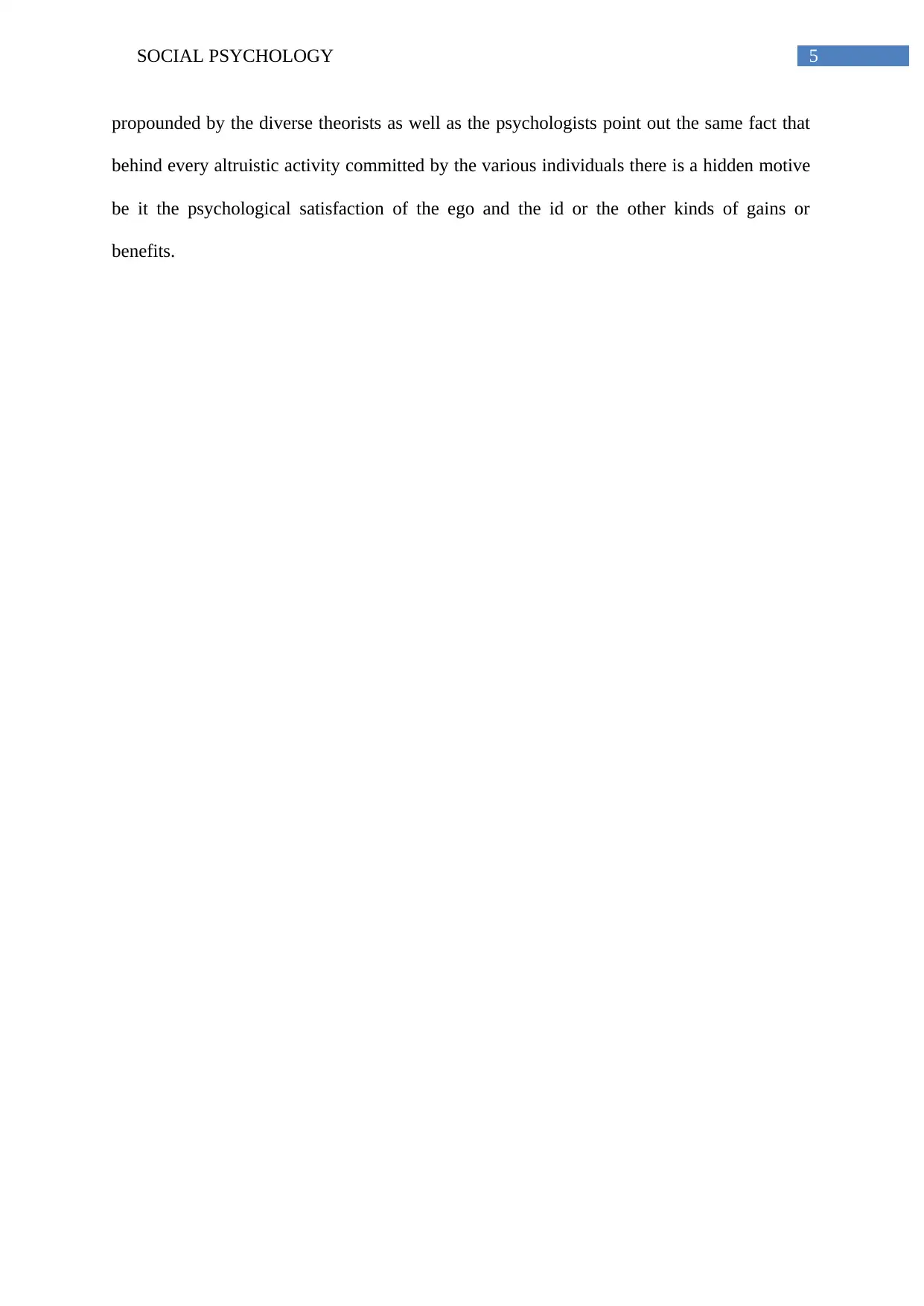
5SOCIAL PSYCHOLOGY
propounded by the diverse theorists as well as the psychologists point out the same fact that
behind every altruistic activity committed by the various individuals there is a hidden motive
be it the psychological satisfaction of the ego and the id or the other kinds of gains or
benefits.
propounded by the diverse theorists as well as the psychologists point out the same fact that
behind every altruistic activity committed by the various individuals there is a hidden motive
be it the psychological satisfaction of the ego and the id or the other kinds of gains or
benefits.
⊘ This is a preview!⊘
Do you want full access?
Subscribe today to unlock all pages.

Trusted by 1+ million students worldwide
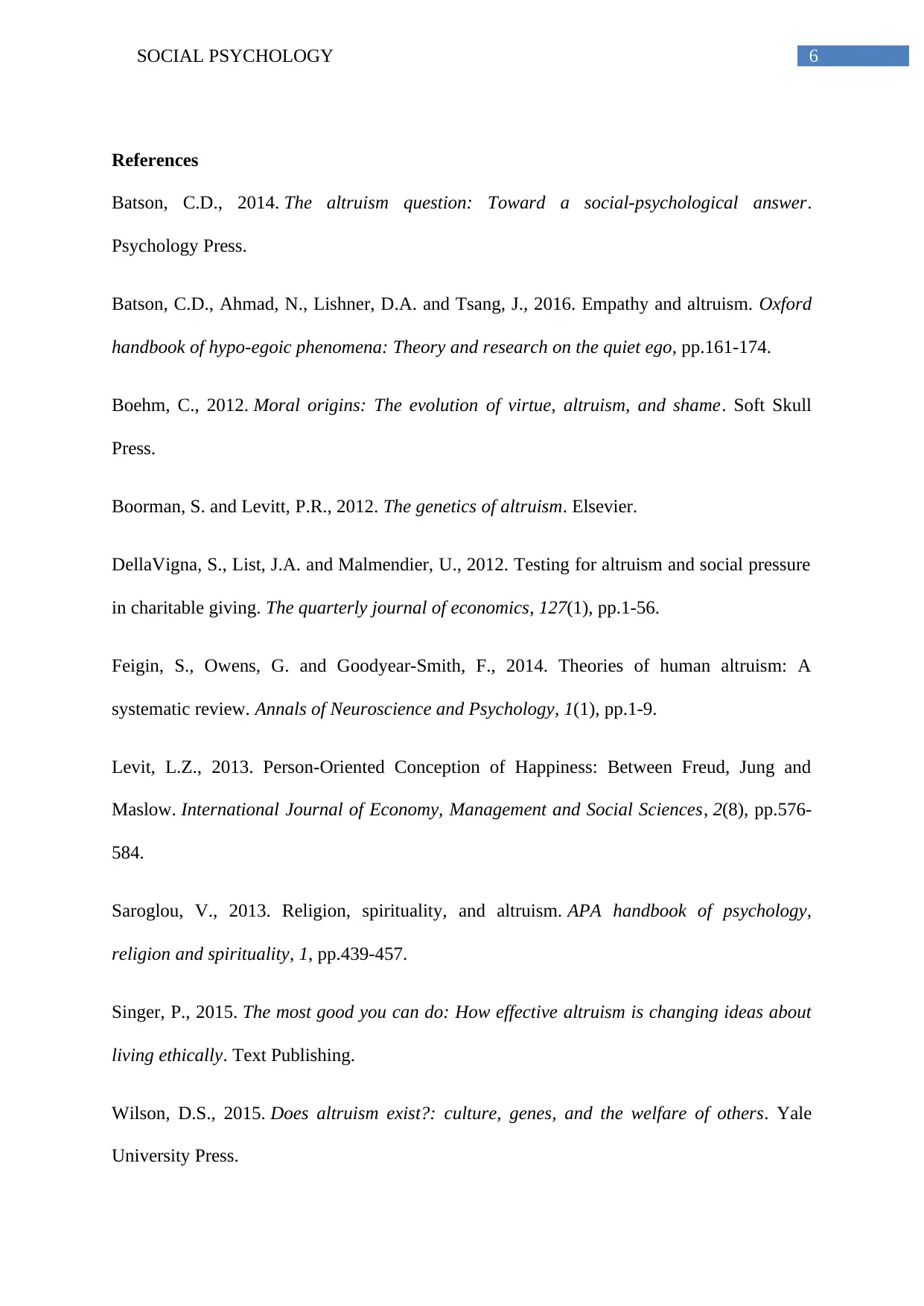
6SOCIAL PSYCHOLOGY
References
Batson, C.D., 2014. The altruism question: Toward a social-psychological answer.
Psychology Press.
Batson, C.D., Ahmad, N., Lishner, D.A. and Tsang, J., 2016. Empathy and altruism. Oxford
handbook of hypo-egoic phenomena: Theory and research on the quiet ego, pp.161-174.
Boehm, C., 2012. Moral origins: The evolution of virtue, altruism, and shame. Soft Skull
Press.
Boorman, S. and Levitt, P.R., 2012. The genetics of altruism. Elsevier.
DellaVigna, S., List, J.A. and Malmendier, U., 2012. Testing for altruism and social pressure
in charitable giving. The quarterly journal of economics, 127(1), pp.1-56.
Feigin, S., Owens, G. and Goodyear-Smith, F., 2014. Theories of human altruism: A
systematic review. Annals of Neuroscience and Psychology, 1(1), pp.1-9.
Levit, L.Z., 2013. Person-Oriented Conception of Happiness: Between Freud, Jung and
Maslow. International Journal of Economy, Management and Social Sciences, 2(8), pp.576-
584.
Saroglou, V., 2013. Religion, spirituality, and altruism. APA handbook of psychology,
religion and spirituality, 1, pp.439-457.
Singer, P., 2015. The most good you can do: How effective altruism is changing ideas about
living ethically. Text Publishing.
Wilson, D.S., 2015. Does altruism exist?: culture, genes, and the welfare of others. Yale
University Press.
References
Batson, C.D., 2014. The altruism question: Toward a social-psychological answer.
Psychology Press.
Batson, C.D., Ahmad, N., Lishner, D.A. and Tsang, J., 2016. Empathy and altruism. Oxford
handbook of hypo-egoic phenomena: Theory and research on the quiet ego, pp.161-174.
Boehm, C., 2012. Moral origins: The evolution of virtue, altruism, and shame. Soft Skull
Press.
Boorman, S. and Levitt, P.R., 2012. The genetics of altruism. Elsevier.
DellaVigna, S., List, J.A. and Malmendier, U., 2012. Testing for altruism and social pressure
in charitable giving. The quarterly journal of economics, 127(1), pp.1-56.
Feigin, S., Owens, G. and Goodyear-Smith, F., 2014. Theories of human altruism: A
systematic review. Annals of Neuroscience and Psychology, 1(1), pp.1-9.
Levit, L.Z., 2013. Person-Oriented Conception of Happiness: Between Freud, Jung and
Maslow. International Journal of Economy, Management and Social Sciences, 2(8), pp.576-
584.
Saroglou, V., 2013. Religion, spirituality, and altruism. APA handbook of psychology,
religion and spirituality, 1, pp.439-457.
Singer, P., 2015. The most good you can do: How effective altruism is changing ideas about
living ethically. Text Publishing.
Wilson, D.S., 2015. Does altruism exist?: culture, genes, and the welfare of others. Yale
University Press.
Paraphrase This Document
Need a fresh take? Get an instant paraphrase of this document with our AI Paraphraser

7SOCIAL PSYCHOLOGY
1 out of 8
Your All-in-One AI-Powered Toolkit for Academic Success.
+13062052269
info@desklib.com
Available 24*7 on WhatsApp / Email
![[object Object]](/_next/static/media/star-bottom.7253800d.svg)
Unlock your academic potential
Copyright © 2020–2025 A2Z Services. All Rights Reserved. Developed and managed by ZUCOL.